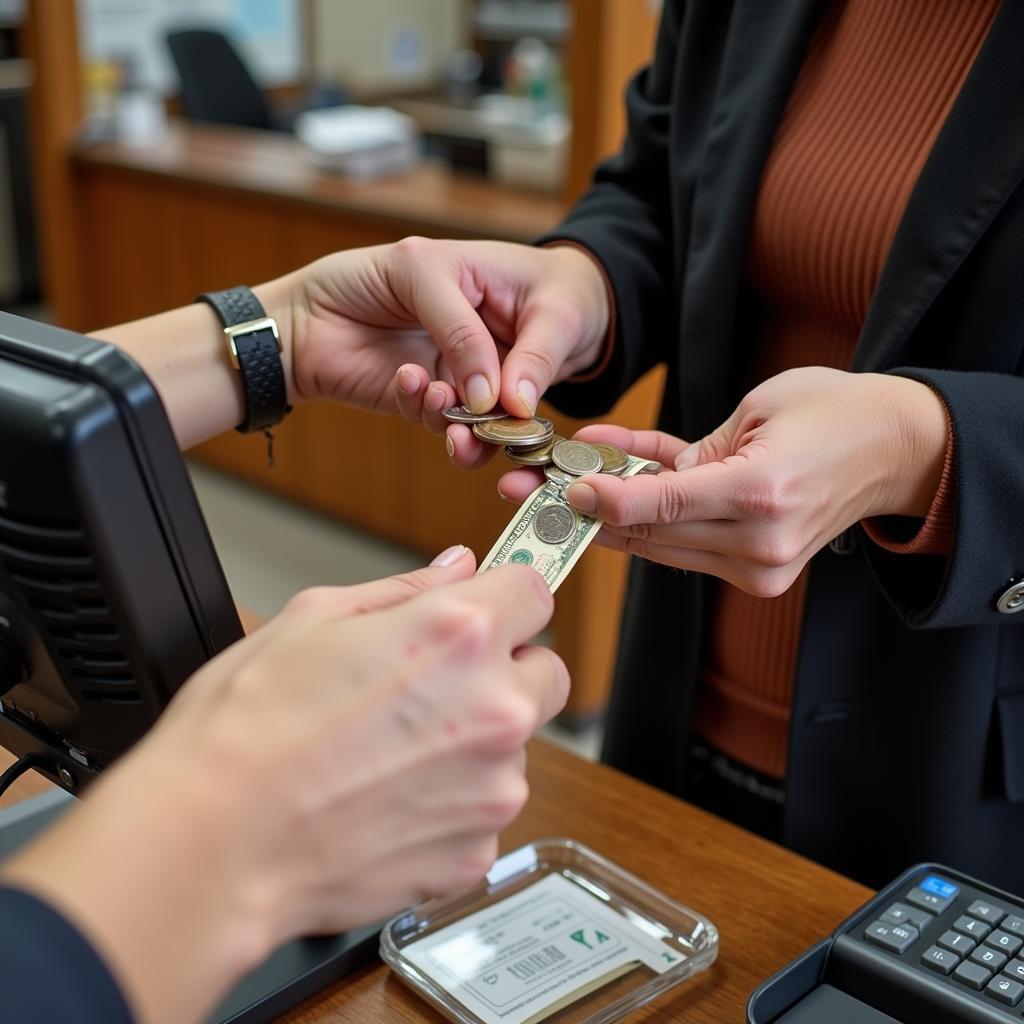Acceptance Of Coins By Banks is a crucial aspect of the financial system, facilitating everyday transactions and ensuring the smooth flow of currency. This article explores the various facets of coin handling by banks, from deposit procedures to the role of technology in managing large volumes of coins.
How Do Banks Handle Coin Deposits?
Banks have established systems for accepting coin deposits from both individuals and businesses. These systems often involve specialized equipment and procedures designed to efficiently process large quantities of coins. While some banks may have dedicated coin counting machines freely available to customers, others may require customers to roll their coins beforehand or may charge a fee for the service.
- Coin Rollers: Many banks provide free coin wrappers to customers. This encourages customers to pre-sort and roll their coins, simplifying the bank’s processing.
- Coin Counting Machines: Some banks offer free coin counting machines, while others may charge a small fee, especially for non-customers. These machines automate the counting process, saving time for both the customer and the bank.
- Manual Counting: In some cases, especially for smaller deposits or in branches without automated systems, bank tellers may manually count and verify coin deposits.
 Bank Accepting Coins
Bank Accepting Coins
The Role of Technology in Coin Handling
Technology plays a vital role in streamlining the acceptance of coins by banks. Automated coin counting and sorting machines significantly reduce processing time and minimize human error. These machines can quickly count and sort different denominations of coins, preparing them for storage or redistribution.
- High-Speed Coin Sorters: Banks often use high-speed sorters to process large volumes of coins. These machines can sort thousands of coins per minute, separating them by denomination and rejecting counterfeit or damaged coins.
- Coin Wrapping Machines: Automated wrapping machines efficiently package coins into standardized rolls, ready for storage or distribution.
- Software Integration: Bank software integrates with coin handling equipment, allowing for accurate tracking of deposits, inventory management, and reporting.
Challenges and Solutions in Coin Acceptance
While banks have efficient systems for handling coins, there are still challenges associated with acceptance of coins by banks. The sheer volume of coins can be a logistical challenge, requiring secure storage and transportation. Furthermore, the cost of maintaining coin handling equipment and staffing can be significant.
- Storage and Transportation: Banks need secure vaults and efficient transportation methods for handling large quantities of coins.
- Cost of Equipment and Staffing: Maintaining and operating coin handling equipment can be expensive. Training staff to use these machines and handle coin deposits also adds to the operational cost.
- Counterfeit Coin Detection: Banks need robust systems to detect and reject counterfeit coins, ensuring the integrity of the currency supply.
 Challenges of Coin Acceptance
Challenges of Coin Acceptance
What Does the Future Hold for Coin Acceptance?
The future of acceptance of coins by banks likely involves increased automation and digital solutions. As technology advances, we can expect to see more sophisticated coin handling equipment and integrated software systems. Digital currencies and contactless payment methods may also impact the role of physical coins in the financial system. While the future of cash remains uncertain, banks will continue to adapt and innovate to efficiently manage coin transactions.
Conclusion
Acceptance of coins by banks is a fundamental service that supports the flow of currency and facilitates everyday transactions. While the increasing prevalence of digital payments may impact the future of cash, banks remain committed to providing efficient and reliable coin handling services. Understanding the processes and challenges associated with coin acceptance by banks offers valuable insights into the complexities of the modern financial system.
FAQ
- Do all banks accept coin deposits? Most banks do accept coin deposits, but policies may vary. It’s always best to check with your specific bank for their procedures.
- Are there fees for depositing coins? Some banks may charge fees for coin counting services, particularly for non-customers or large deposits.
- Do I need to roll my coins before depositing them? Many banks encourage customers to roll coins beforehand, but some offer coin counting machines that eliminate this need.
- What happens to the coins after they are deposited? Banks typically process and sort the coins, either redistributing them to other customers or returning them to the central bank.
- Can I deposit foreign coins? Generally, banks only accept deposits of domestic currency.
- What should I do if I have a large quantity of coins to deposit? Contact your bank in advance to discuss the best course of action for large coin deposits.
7.. Can businesses deposit coins? Yes, businesses can deposit coins, but often face different procedures and fees compared to individual customers.
Gợi ý các câu hỏi khác, bài viết khác có trong web.
- Quy trình xử lý tiền mặt tại ngân hàng như thế nào?
- Các dịch vụ khác mà ngân hàng cung cấp là gì?

